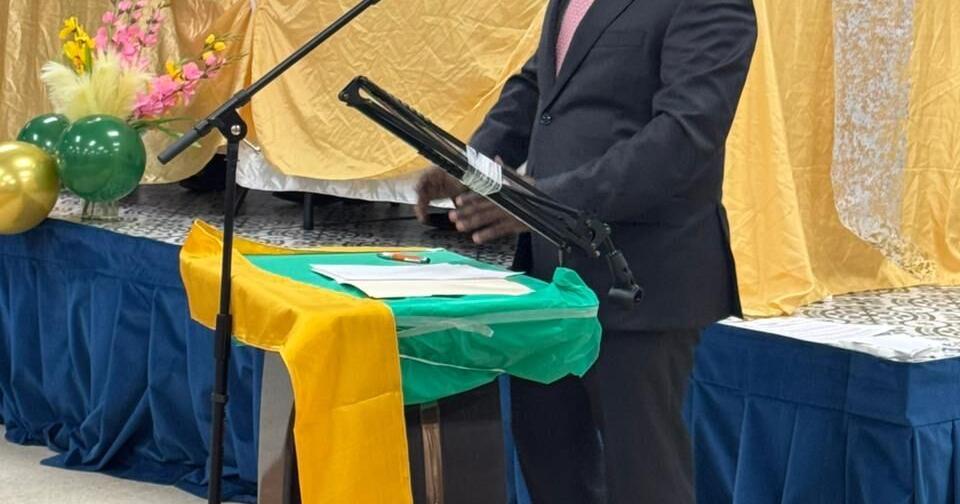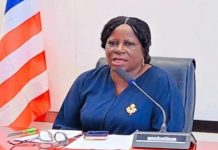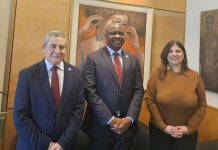Africa-Press – Liberia. Folcroft, Philadelphia – Besides deforestation, illegal mining has severe and a lasting impact on the environment. Its consequences are broad and affect various aspects of ecosystems, biodiversity and the well-being of local communities.
In Liberia, the issue of illegal mining by foreigners, especially Ghanaians, Nigerians and other nationalities, is seriously exploiting precious metal without having any regard for the significant environmental devastation of their operations, as well as environmental consequences of mercury poisoning.
Grand Kru County, one of the coastal counties in Southeastern Liberia, has been plagued with illicit mining, spanning over eight years.
The Speaker of the House of Representatives of the 55th Legislature, Cllr. J. Fonati Koffa, who is also Representative of Grand Kru County District #2; told his kinsmen in the United States of America (USA), that the most urgent problem in Grand Kru is illegal mining, which has become an existential threat to the way of life in the county.
“Now our county is plagued with illicit mining which has become an existential threat to our way of life. Ghanaian miners first migrated to the county with dredges and now have been joined by miners from other counties to devastatingly exploit the land.
Many of you may not realize the long term consequences of this industry: floods have increased; rivers are highly polluted; but most of all our children are leaving school and running to the gold fields in search of a livelihood that will give them no future if they are lucky; and if they are not will lead to early death and destruction. If we cannot solve the illicit mining problem, our county will be a wasteland in a few years,” Speaker Koffa lamented.
Outlining suggestions to lift Grand Kru and the entire southeastern region, the Speaker said there is a need for a tougher approach that is both sustainable and inclusive: an asset-based approach to development.
Speaker Koffa said: “The talents, skills, and determination of the people of Grand Kru and the southeast are the building blocks of any development agenda. It is crucial that we invest in education and vocational training, not just for our youth but for all members of our community.
The Speaker challenged citizens of Grand Kru County, residing in the US and other parts of the world to redirect and focus on solving the problems in the county, by partnering with each other, stressing that development is not a solo journey.
“We must foster partnerships—with government, international organizations, and the private sector. But just as importantly, we must partner with each other. The Grand Kru Development Association, along with other organizations and stakeholders in the southeast, must lead the way by uniting our resources, sharing knowledge, and creating opportunities for collaboration,” the Speaker ranted.
“We must build schools, train our teachers, and ensure that the education our children receive prepares them for the future. That is why we built six schools over the last 6 years in our district. Regrettably, we need teachers in those schools. It is sad to put up a new school building and come back a year later and see it populated by goats and cows, only to be told that there are no teachers.”
He added: “Beyond formal education, we should also promote entrepreneurial initiatives and develop programs that support small and medium enterprises in agriculture, trade, and technology. By investing in our human capital, we ensure that our people are equipped to drive the development process themselves.”
Besides the issues of getting rid of the illicit miners, and building schools, roads and other basic infrastructure, the Speaker reminded his kinsmen in the US of safeguarding the cultural heritage and identity and can be achieved by integrating cultural programs into the county’s schools, supporting a artists, musicians, and craftsmen, by using the county’s rich history to promote tourism.
“ By showcasing our culture on a national and international stage, we bring attention to Grand Kru, attracting investment and pride in who we are. But most importantly, we can take advantage of our county’s natural beauty to create a tourist industry,” the Speaker smiled.
“ Grand Kru has the most pristine and beautiful beaches and virgin lands that surround those beaches in need of hotels and guest houses for vacation and retreats and family reunions. Yes, we in government have to do our part to upgrade Grandcess Airport and rehabilitate Sasstown Airport. We look forward to budgetary support for these ventures.
Most importantly, we must be persistent in our quest for the southeast coastal highway. The southeast caucus is determined to spend 50 million dollars a year for the next six years to pave that highway. As the budget is a political tool, this becomes an uphill battle. But with the leadership proximity we have we are positive that we can accomplish this.”
The House’s Speaker stressed that the coastal highway is not only good for the southeast but the entire Liberia.
“Imagine the southeast sits next to the fastest growing economy in West Africa: the Ivory Coast. With its strong cocoa industry, Ivory Coast has surpassed Liberia in rubber production. A truck leaving Monrovia to Cote D’ivoire takes about 2 weeks to make the journey, which would ordinarily take 3 days if the roads were paved. This has resulted in astronomical costs of goods and services. It has made rural areas more dangerous and unbearable for our people. The price of gas in Monrovia is about $3USD while the price of gas in Barclayville is $6USD.”
Meanwhile, the two-term’s Grand Kru County lawmaker emphasized in Philadelphia, that every citizen of Grand Kru has a role to play in lifting the county and the region; whether through investment, skills transfer, advocacy, or simply by sharing knowledge and networks, among others.
“The road to development is not an easy one, but by focusing on our assets, by believing in our own strengths, and by working together, we can create a future where Grand Kru and the southeast thrive—not just for today, but for generations to come.”
For More News And Analysis About Liberia Follow Africa-Press






